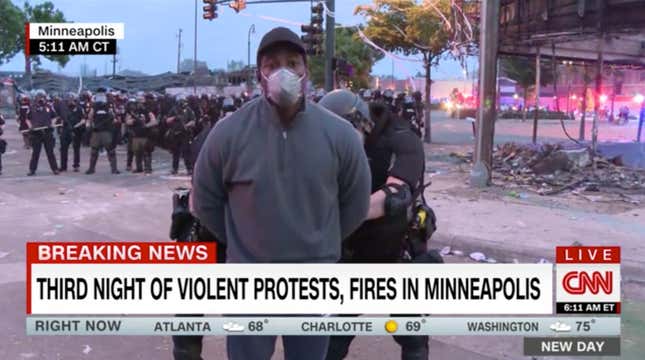
I knew what I was getting into.
I grew up reading the newspaper daily, since about age 11. I started watching the evening news—both the local and the national broadcasts—around the same time. My earliest media memories are of the 1987 Iran-Contra hearings and the Challenger explosion the year prior. Every weekend I watched Tim Russert on Meet the Press, as well as CBS’ 60 Minutes with my parents.
It wasn’t a surprise that I would want to be and would become a journalist, because I saw how the news changed lives—for better or worse—by showing us the world around us. Not everyone can go to the school board meeting. Not everyone can protest. Not everyone can travel to different regions of this country, let alone the world, to know what’s happening first-hand. They need journalists. They need the news.
But journalists are people. And people have a breaking point.
We all know the James Baldwin quote about how being black and relatively conscious means being in a rage all the time. This is also the plight of the black journalist. If you think consuming black death day in and day out can be remedied by some “emotional distance” and “journalistic integrity,” you are wrong.
After Hurricane Katrina, a study was done looking at how black people viewed black victims versus how white people viewed white victims in similar circumstances. The study revealed that the stronger a person identified with being African American, the more likely they were to feel empathy for another black person in peril. Being a reporter, blogger, editor, broadcaster or any kind of journalist does not imbue you with the ability to turn your humanity off, white or black, but black people—who can’t get a get-out-of-racism free card no matter their education, socio-economic status, background or zip code—are acutely sensitive to stories like these. The deaths of Ahmaud Arbery, Breonna Taylor, Tony McDade and George Floyd—all at the hands of either white vigilantes or state-sponsored violence—take a toll. Never mind the threat of death-by-cop levied at bird-watcher Christian Cooper by a white woman, Amy Cooper, in New York City’s Central Park. It’s hard to look at things like this, including the arrest of CNN reporter Omar Jimenez, and not think “This could have been me” or “This could have been someone I love”—because it can and it has been.
I no longer remember the first time I read a story about a black person being killed by the police. In my hometown of St. Louis, it happened throughout my childhood, before the death of Mike Brown and the Ferguson uprisings, and continues to happen to this day. At one point in my youth, local activists even cut a radio commercial instructing black people how to interact with police, an act of oppressed people trying to grapple with what little they could control in a situation beyond that.
The first real uprising in my lifetime that I remember over police violence was the LA Riots in 1992 after all the officers involved in the videotaped beating of Rodney King were acquitted. I still remember my own shock (and everyone’s shock, honestly) when they were set free despite all the evidence of their brutality. It was the first time many got to witness what state-sponsored violence looks like, putting visuals to something black people had been talking about and protesting against since the advent of segregation and the end of slavery. It was television, as Rev. Martin Luther King Jr. predicted, that would show America’s true face.
“We are here to say to the white men that we no longer will let them use clubs on us in the dark corners,” King said. “We’re going to make them do it in the glaring light of television.”
This is the same logic behind showing the Rodney King beating, or the cellphone camera footage of the many deaths and beatings that have taken place at the hands of police officers against black men, women and children in recent years. But as necessary as these images are, they take a toll on all who witness them, including the press, and in particular black journalists.
I can’t tell you how many times I, or someone on my team, has cried into their laptops over the injustices inflicted daily on black people, who have gone to bed with anxiety over what looms in the morning, in the aftermath of another violent act against our humanity.
We at The Root are fortunate in that we can comfort each other and find solace in our shared pain, but so many other black journalists at predominantly white-run media outlets don’t have this luxury—of someone asking if they are OK. Of someone asking, “do you need to take time off?” Of someone suggesting therapy or some other support to get through the crisis. Because often, to white people, this is just another news story. For us, this is our lives...and our deaths, displayed for public consumption, often without context or understanding.
As those exhausted look away for their own mental health, we cannot. We labor on because we have a cause bigger than ourselves. But it doesn’t mean we don’t turn to friends, family, colleagues and therapy to get through his, because we do. I ask for those consuming this news site and many, many other black journalists’ work understand that we are reporting while dealing with our own life-long post-traumatic stress from repeatedly bearing witness to our dehumanization and murder.
The pain is real. It lingers. And what we witness today will shape us for the rest of our lives.

